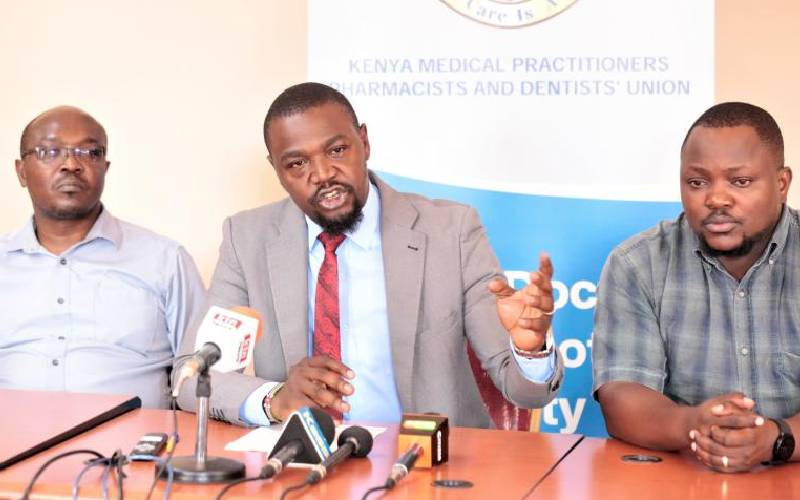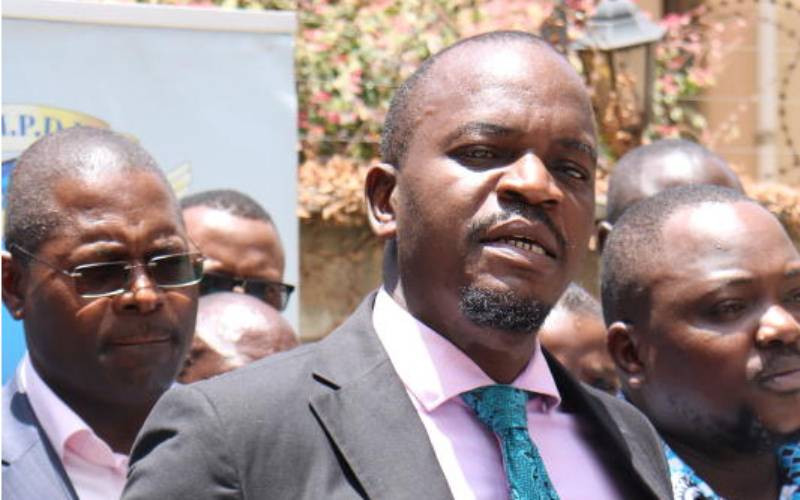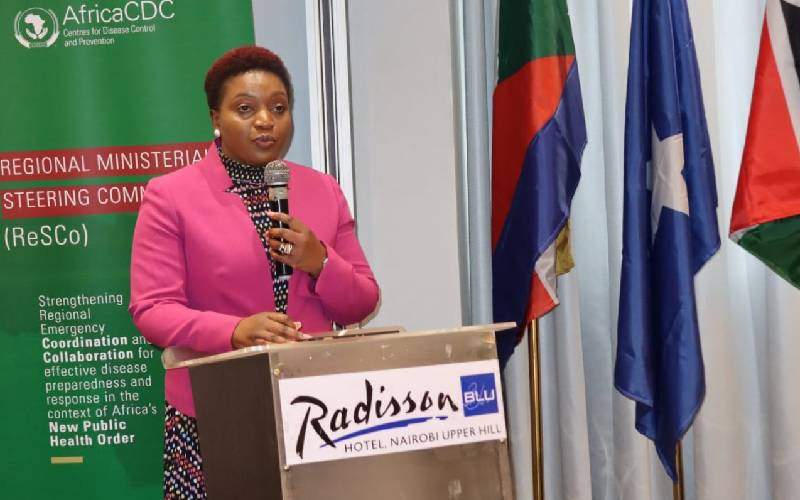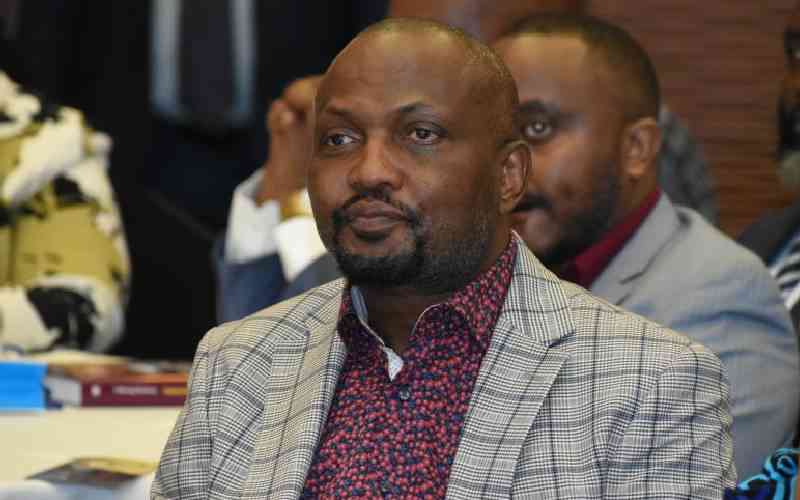
As the country takes its early steps into 2024, Kenyans across the nation are facing a health crisis due to unresolved disputes among healthcare workers.
Various health cadres have issued threats to go on strike, accusing both the national and county governments of neglecting to address their concerns, particularly the slow implementation of the Collective Bargaining Agreement (CBA).
One significant challenge contributing to subpar service delivery to patients nationwide is the insufficient staffing of health professionals in the appropriate mix.
In Embu, doctors have issued a strike notice, while their counterparts in Kakamega, Busia, and Vihiga have expressed their intention to strike.
Nakuru County recently experienced a work stoppage, and the raised issues have yet to be resolved.
KMPDU South Rift Region Secretary-General, Dr. Stephen Omondi, said doctors have not seen the implementation of their 2017/21 Collective Bargaining Agreement (CBA).
In the county, doctors have also raised concerns about remuneration and employment being offered on a contractual basis.
- Protests halt major health services in Kenya
- Protests are hurting health sector, Doctors lobby
- Proposed Conflict of Interest Bill contradicts Employment Act, doctors say
- Botswana seeks pharmacists from abroad after nurses halt dispensing medications
Keep Reading
Meanwhile, in Meru, nurses threatened to strike in December, citing the need for a better working environment and promotions. Nesbit Mugendi, the Secretary-General of the Kenya National Union of Nurses (KNUN), highlighted that nurses have not received promotions in the past 10 years.
Dr. Davji Atellah, Secretary-General of the Kenya Medical Practitioners and Dentist Union (KMPDU), expressed concerns that there seems to be a lack of goodwill to address the issues, potentially leading to a nationwide strike in 2024.
Atellah warned, "In 2024, we might not avoid a nationwide strike." He explained that in 2023, doctors engaged in negotiations with the Council of Governors and the government regarding the 2017/21 CBA, but no agreement was reached.
Instead of addressing the matters outlined in the CBA, such as the employment of more doctors, promotions, and the provision of comprehensive health coverage, negotiations and counter-talks took place.
“Comprehensive medical cover is also a matter of concern for doctors. We are grappling with employment issues, as hospitals operate on a low-key, and working doctors are overwhelmed, with some not having taken leave for the past three years,” said the doctors' representative.
Atellah said in 2024, the government must change its operational model by fulfilling its promises.
In 2023, doctors in at least 18 counties went on strike, while others issued strike notices.
Doctors in Embu have declared their intention to down tools on January 10, 2024, while those in Nakuru, Busia, and Vihiga have presented demands to their respective county governments.
They have threatened to go on strike if these demands are not met.
“We may not focus on specific counties but rather address the issues of doctors on a national level,” said Atellah.
He added, “The government only takes action when there is duress. It seems to prioritise issues only during a strike. Instead of goodwill, we observe ill-will simply because those in authority do not proactively work towards finding solutions.”
“There are promises and counter-promises. In 2023, we had government time, but nothing is being done,” he added.
Furthermore, doctors complain about the government's failure to fund specialised training, despite the acute shortage of specialists in the country.
Under devolved structures, it is the Ministry of Health's role to train doctors, while the counties are responsible for employing them for service delivery.
According to the Kenya Medical Practitioners and Dentist Council (KMPDC), Kenya has 2,000 specialised doctors.
“The Ministry should allocate a budget for the training of specialized doctors. We cannot discuss critical care under UHC policies without specialized doctors,” said Atellah.
He criticised both the county and national governments for failing to address the issue of healthcare workers comprehensively.
According to him, both arms of the government select when to intervene.
“We should not choose to say when health is devolved and when health is national. The national government seems to take action when there is something beneficial; it says health is national, like UHC.
"But in terms of responsibility, like employment, they maintain health is devolved, yet finances aren’t fully devolved to run counties,” he said.
Kenya Clinical Officers (KUCO) Secretary-General, George Gibore, said the issue with Collective Bargaining Agreement (CBA) negotiations has persisted for more than four years.
He said the negotiations began in 2017, but decisions regarding the main issues are yet to be addressed by the authorities.
“The CBA is the most significant issue that has been ongoing for years, and we are still at the negotiating table. It is concerning that authorities appear to be negotiating, but no decisions are made on key issues."
Among the key issues yet to be agreed upon, he cited monitoring and harmonisation of terms of engagement.
In 2023, clinical officers issued two notices to counties through the Council of Governors. However, Gibore said when the notices are issued, governors pretend to be concerned. Yet, during negotiations, they buy time without resolving anything. The clinical officer's CBA matter is currently in court, awaiting a verdict for further action.
“When in court, you still have leverage to engage and see whether you can reach an agreement. This is why we have been pushing them to the table so that we can agree,” said Gibore.
The clinical officers' representative expressed regret that counties are employing individuals on contracts, contrary to the Employment Act.
Harmonisation of salaries, lack of promotions, and delayed salary payments are also among the issues facing clinical officers, including interns.
“Counties are managing health as they wish. We have no job security, and if there are employments, there are no proper structures,” said Gibore.
He added, “It is also concerning that governors pay when they feel like it, an issue that greatly affects the morale of employees.”
Since 2017, clinical officers have gone on strike seven times due to the failure to realise the CBA, a move that affects service delivery.
 The Standard Group Plc is a multi-media organization with investments in media platforms spanning newspaper print
operations, television, radio broadcasting, digital and online services. The Standard Group is recognized as a
leading multi-media house in Kenya with a key influence in matters of national and international interest.
The Standard Group Plc is a multi-media organization with investments in media platforms spanning newspaper print
operations, television, radio broadcasting, digital and online services. The Standard Group is recognized as a
leading multi-media house in Kenya with a key influence in matters of national and international interest.











